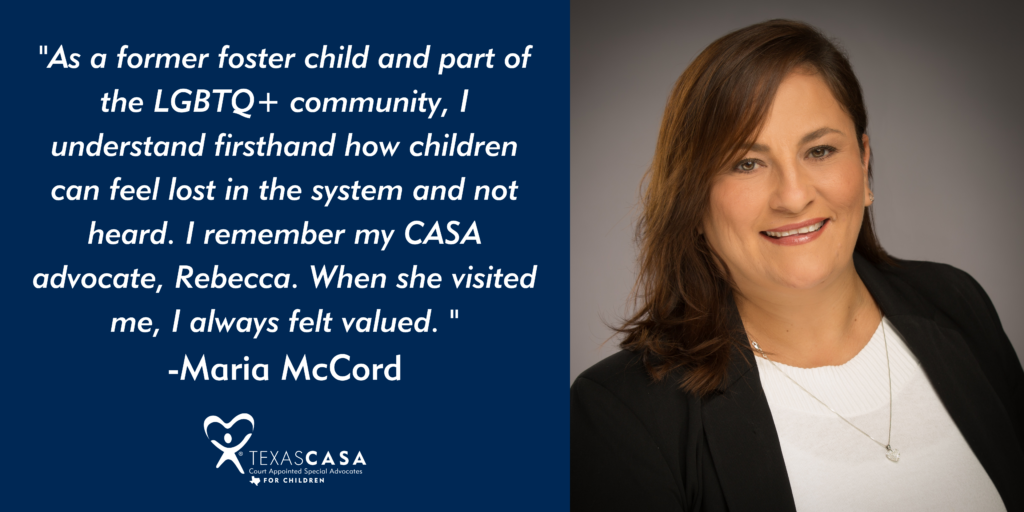
Maria McCord is a Collaborative Family Engagement (CFE) Coach for Texas CASA. She was born and raised in El Paso, Texas and has more than 20 years of experience working with children in foster care and nonprofit organizations. She has her bachelor’s degree in human services as well as her master’s degree in business administration, and is in the process of completing her master’s degree in social work.
Tell us about yourself and what drew you to working in the child welfare space.
I was in foster care and spent a lot of time at the local runaway shelter. Once I graduated high school, I began working at the same runaway shelter and found the work to be rewarding. After receiving my bachelor’s in human services, I worked with organizations that specialized in mental health intellectual and developmental disability services (MHMR), homeless shelters and then eventually the Department of Family and Protective Services (DFPS). I worked for DFPS for nine years, most recently as a Master Investigator where I trained and mentored other investigators and resolved stale cases. I traveled all around Texas working in different regions to train, mentor and close cases.
How long have you worked for Texas CASA, and how did you get involved with the CASA mission?
I have had the pleasure of working for Texas CASA since 2017 as a Collaborative Family Engagement Coach.
I worked alongside CASA volunteers throughout my early career and always admired the care, concern and diligence they took with each child they were assigned to. I viewed them as a valued partner and consulted with the advocates regularly. Their perspective and dedication to the children served was invaluable. I knew that I wanted to be involved more directly with the CASA mission, so applying for a job at Texas CASA felt like a natural choice.
Tell us about your work on the Collaborative Family Engagement (CFE) team.
Working with the CFE team has been some of the most meaningful work I have in social services. As an investigator, my role was to keep children safe, but I was not always aware of the emotional impact separation was having on the children and families. I was solely focused on safety. With the CFE team and the principles of connection, I can be on the other side of that work and reconnect children to their families and kin who love and miss them. The full circle of my career has been the most gratifying.
CFE works towards engaging family and other members of the community to provide connections and support to children in foster care. These connections extend to the parents and/or guardians involved with Child Protective Services (CPS). My main role is to coach and train CASA volunteers, CPS/SSCC* staff and local CASA program staff in CFE principles and how to work together to find the best outcome for the child and their family. When I’m not traveling to train, I am usually conferencing with local programs, consulting on cases, video conferencing with my fellow coaches and answering emails.
How does your personal experience impact your work at Texas CASA?
As a former foster child and part of the LGBTQ+ community, I understand firsthand how children can feel lost in the system and not heard. I remember my CASA advocate, Rebecca. When she visited me, I always felt valued. I knew she would advocate for me in court and would come back with news on my case. She was assigned to me until she passed away while I was still in care. She always encouraged me to go to school and always showed compassion and concern. Her intervention and dedication inspired me to work with children in foster care.
It is this same compassion that I try to bring forward in my work. I work to honor the role of the advocate/volunteer and remind them of the impact they will forever have on the children they are assigned. I remind advocates/volunteers to leave a gentle, meaningful footprint on the lives of the children and to work hard to reconnect or strengthen those connections they already have. The children and families will remember their impact for a lifetime.
Being part of the LGBTQ+ community also allows me to have an open dialogue with advocates and volunteers about any biases that come up. Statistically, 30% of youth who are currently in foster care identify as LGBTQ+. Because of my experience, I am always looking for new resources in the community that I can share with the programs to support the youth.
What is your favorite part about your job?
My favorite part of my job is working alongside CASA staff/volunteers and CPS/SSCC* partners who are just as passionate about their work and strategizing on how we can have better outcomes for the families and children we serve. I love being a part of a team and watching the team work collectively to resolve a case. Every day offers new opportunities to connect children to family members and to help a family heal.
*Single Source Continuum Contractor